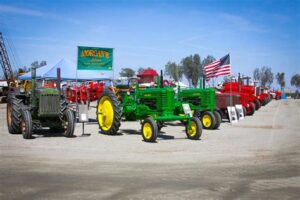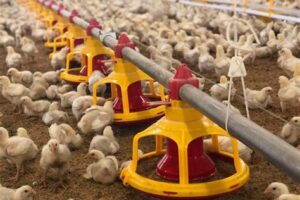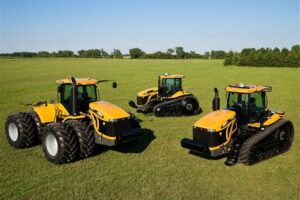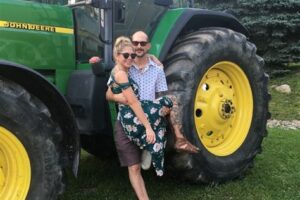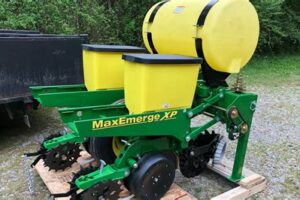Table of Contents
Dairy farm equipment is essential for the efficient management and operation of a dairy farm. It includes milking machines, milk cooling tanks, automatic feeders, and manure handling systems. These equipment help streamline daily tasks, improve milk quality, and enhance overall productivity. Discover a wide range of reliable and high-quality dairy farm equipment to optimize your dairy farming operations.
When it comes to maintaining a successful dairy farm, having the right equipment is absolutely crucial. From milking machines to feeding systems, every aspect of dairy farming relies heavily on efficient and reliable tools. However, with the wide range of options available on the market, choosing the right dairy farm equipment can be a daunting task. Whether you’re a seasoned farmer looking to upgrade your current setup or a newcomer to the industry in search of the best tools to start your venture, we are here to help. In this article, we will explore the essential equipment needed for a modern dairy farm, highlighting the key features and benefits that set them apart.
Dairy Farm Equipment: Ensuring Productivity and Efficiency
Running a successful dairy farm requires the use of appropriate equipment that ensures productivity and efficiency. Over the years, advancements in technology have revolutionized the dairy industry, making it easier for farmers to manage their operations effectively. From milking machines to feeding systems, there is a wide range of dairy farm equipment available to meet the diverse needs of modern dairy farms.
Milking Machines: Streamlining the Milking Process
Milking machines have become an essential piece of equipment on dairy farms, greatly simplifying the milking process. These machines are designed to efficiently extract milk from cows, reducing labor requirements and improving milking speed. With automated milking systems, farmers can easily monitor milk production, identify any abnormalities, and maintain accurate records.
Cattle Feeders: Ensuring Optimal Nutrition
Nutrition plays a crucial role in the overall health and productivity of dairy cattle. Cattle feeders are used to provide a balanced and nutritious diet to the animals. These feeders are designed to dispense the right amount of feed at regular intervals, ensuring that each cow receives an appropriate ration. Automatic feeders can also be programmed to accommodate specific dietary requirements for different stages of lactation.
Calf Hutches: Promoting Healthy Calf Development
Proper housing is essential for the healthy development of young calves. Calf hutches provide a safe and comfortable environment for newborns, protecting them from harsh weather conditions and potential disease transmission. These individual housing units allow farmers to closely monitor each calf’s growth and health, ensuring they receive the necessary care and nutrition.
Milk Cooling Tanks: Preserving Quality and Safety
Proper milk handling and storage are crucial to maintain its quality and safety. Milk cooling tanks are used to rapidly cool raw milk to the desired temperature, inhibiting bacterial growth and preserving its freshness. These tanks are equipped with state-of-the-art technology to monitor and maintain optimal storage conditions, ensuring that the milk meets stringent quality standards.
Manure Management Systems: Sustainable Waste Management
Managing animal waste is a significant challenge on dairy farms. Manure management systems help control and process waste efficiently, minimizing environmental impact and maximizing resource utilization. These systems often include manure separators, digesters, and storage facilities that enable farmers to convert waste into valuable fertilizers or generate renewable energy.
Automatic Cleaning Systems: Maintaining Hygiene and Sanitation
Hygiene and sanitation are critical aspects of dairy farming to ensure the health of both animals and consumers. Automatic cleaning systems are used to efficiently clean milking parlors, equipment, and other farm facilities. These systems use high-pressure water jets and specialized detergents to remove dirt, bacteria, and other contaminants, reducing the risk of infection and maintaining a clean environment.
Cow Monitoring Systems: Enhancing Animal Welfare
Monitoring the health and well-being of dairy cows is essential for their welfare and productivity. Cow monitoring systems utilize various sensors and wearable devices to track vital parameters such as body temperature, rumination, and activity levels. This data helps farmers detect early signs of illness, optimize breeding cycles, and ensure optimal comfort for the cows.
Farm Management Software: Streamlining Operations
Modern dairy farms require efficient management to ensure profitability and sustainability. Farm management software provides farmers with comprehensive tools to handle various tasks, including milk production monitoring, feed management, financial analysis, and herd health records. By streamlining these processes, farmers can make informed decisions, optimize resource allocation, and enhance overall farm productivity.
Robotic Milking Systems: The Future of Dairy Farming
The advent of robotics has revolutionized the milking process on dairy farms. Robotic milking systems offer automated yet individualized milking for cows, allowing them to be milked whenever they desire. These systems use sensors to identify and guide cows into milking stations, where robotic arms attach and detach milking units. This technology not only reduces labor requirements but also improves cow comfort and milking efficiency.
In conclusion, dairy farm equipment plays a vital role in ensuring the productivity and efficiency of modern dairy operations. From milking machines to robotic milking systems, these advancements in technology have greatly benefited farmers by simplifying tasks, improving animal welfare, and optimizing resource utilization. By embracing these innovations, dairy farmers can stay competitive in an ever-evolving industry and meet the growing demand for high-quality dairy products.
Importance of Quality Dairy Farm Equipment:
Quality dairy farm equipment is crucial for the efficient and profitable operation of a dairy farm. Reliable equipment, including milking machines, bulk milk tankers, and cooling systems, play a vital role in maintaining milk quality, preventing contamination, and reducing operational costs. By investing in high-quality equipment, dairy farmers can optimize their operations and uphold industry standards.
Milking Equipment: Innovations and Advancements:
Modern milking equipment has undergone significant advancements in recent years, offering dairy farmers improved efficiency and cow comfort. Automated milking systems, electronic milk meters, and teat sanitization technologies help streamline the milking process, ensure accurate data collection, and promote udder health. These innovations enhance the overall productivity and welfare of dairy farms.
Cooling Systems: Preserving Milk Quality:
Proper cooling and storage equipment are vital for preserving the quality and freshness of milk. Refrigeration units, bulk milk tanks, and plate coolers efficiently cool and store milk, preventing bacterial growth and maintaining the desired temperature. Effective cooling systems not only extend the milk’s shelf life but also contribute to better taste, higher nutritive value, and improved marketability.
Feeding Equipment: Ensuring Balanced Nutrition:
Dairy cows’ nutritional needs are of utmost importance for optimal milk production and herd health. Well-designed feeding equipment, such as feed mixers, silage choppers, and automatic feeders, ensure the provision of a balanced diet for the herd, containing essential nutrients and minerals. Investing in reliable feeding equipment helps maximize milk yields and maintain the overall well-being of dairy cattle.
Animal Comfort Systems: Enhancing Herd Welfare:
Dairy farmers must prioritize the well-being and comfort of their animals to ensure optimal productivity and minimize stress-related issues. Cow comfort systems, including barn ventilation, bedding materials, and rubber flooring, contribute to better herd health, higher milk yields, and reduced lameness. Appropriate animal comfort equipment ultimately translates into happy, contented cows and increased profitability.
Waste Management Equipment: Environmental Sustainability:
Effective waste management is crucial in any dairy farm operation to minimize environmental impact and comply with regulations. Equipment such as manure separators, biogas digesters, and effluent treatment systems help convert waste into valuable resources, including fertilizer and renewable energy. By implementing sustainable waste management practices, dairy farms can contribute to a greener future and enhance their public image.
Calf Rearing Equipment: Setting Up for Success:
The proper rearing of calves is essential for the future productivity and longevity of a dairy herd. Calf rearing equipment, such as calf hutches, automatic milk feeders, and temperature-controlled environments, provide optimal conditions for calf growth, health, and development. Investing in high-quality calf rearing equipment promotes a strong start for the next generation of dairy cows.
Regular Maintenance and Upkeep: Maximizing Equipment Lifespan:
To ensure the longevity and optimal performance of dairy farm equipment, regular maintenance and upkeep are essential. Prompt servicing, cleaning, and replacement of worn-out parts help prevent breakdowns, reduce operational downtime, and extend the lifespan of the equipment. By adhering to a well-defined maintenance schedule, dairy farmers can optimize their equipment investment and avoid costly replacements.
In today’s modern dairy industry, the use of high-quality farm equipment is essential for efficient and productive milk production. Dairy farmers rely on a wide range of equipment to streamline their operations and ensure the well-being of their animals. From milking machines to feeders and cooling systems, these tools play a crucial role in maximizing productivity and maintaining the highest standards of animal welfare.
Here are some key points highlighting the importance of using professional dairy farm equipment:
- Enhanced Efficiency: The use of advanced dairy farm equipment significantly increases the efficiency of milk production. Modern milking machines, for example, can handle multiple cows simultaneously, reducing the time and labor required for milking. This not only saves valuable time but also allows farmers to increase their herd size without compromising on productivity.
- Improved Animal Welfare: Professional dairy farm equipment is designed with the well-being of animals in mind. For instance, automated feeders ensure that each cow receives the right amount of food at the appropriate times, promoting optimal growth and health. Additionally, cooling systems help maintain comfortable temperatures, preventing heat stress during hot weather. By investing in such equipment, farmers can provide a conducive environment for their animals, leading to healthier and happier cows.
- Consistent Milk Quality: High-quality dairy farm equipment ensures consistent milk quality. Milking machines equipped with advanced technology can monitor milk quality in real-time, detecting any abnormalities or signs of infection. This allows farmers to take immediate action, ensuring that only clean and healthy milk enters the production process. Consistency in milk quality not only satisfies consumers but also helps maintain the reputation and profitability of dairy farms.
- Reduced Labor Costs: By utilizing professional dairy farm equipment, farmers can minimize labor costs. Automated tools, such as robotic milking systems, reduce the need for manual labor during the milking process. This frees up valuable time for farmers to focus on other essential tasks, such as herd management and farm maintenance. Additionally, fewer employees are required to operate and maintain the equipment, resulting in significant cost savings.
- Long-term Investment: Investing in professional dairy farm equipment is a long-term investment for farmers. High-quality equipment is built to withstand the demands of daily use and offers durability and reliability. By choosing reputable brands and regularly maintaining the equipment, farmers can extend its lifespan and avoid frequent replacements. This not only saves money in the long run but also ensures uninterrupted milk production.
In conclusion, the use of professional dairy farm equipment is crucial for today’s dairy industry. By enhancing efficiency, promoting animal welfare, ensuring milk quality, reducing labor costs, and providing a long-term investment, these tools have become indispensable for modern dairy farmers. Embracing such equipment not only benefits the farmers themselves but also contributes to sustainable and responsible milk production.
Thank you for visiting our blog and taking the time to learn more about dairy farm equipment. We hope that the information provided has been helpful and informative, giving you a deeper understanding of the importance of quality equipment in the dairy farming industry.
As you have learned throughout this article, dairy farm equipment plays a crucial role in ensuring the efficiency, productivity, and overall success of a dairy farm operation. From milk production to feeding and milking processes, having the right equipment can significantly impact the profitability and sustainability of a dairy farm.
Investing in high-quality dairy farm equipment is not only essential for the well-being of the cows but also for the financial stability of the farm. The use of modern and efficient equipment can help increase milk production, improve cow comfort, and reduce labor and operational costs. By incorporating advanced technologies and innovations, farmers can streamline their processes and achieve higher levels of efficiency and productivity.
In conclusion, dairy farm equipment is an integral part of any successful dairy farming operation. It is important to carefully research and invest in the right equipment that meets the specific needs and requirements of your farm. By doing so, you can ensure the well-being of your cows, optimize milk production, and ultimately drive the profitability and sustainability of your business.
We hope you found this article insightful and valuable. If you have any further questions or would like to learn more about dairy farm equipment, please do not hesitate to reach out to us. Our team of experts is always ready to provide assistance and guidance to help you make informed decisions for your dairy farm. Thank you once again for visiting our blog, and we wish you all the best in your dairy farming endeavors.
Video Dairy Farm Equipment
1. What are the essential equipment needed for a dairy farm?
Setting up a dairy farm requires several essential pieces of equipment to ensure efficient operation and animal care:
- Milking machines
- Milk storage tanks
- Milk cooling systems
- Cattle feeding equipment
- Cattle identification tags
- Cattle grooming tools
- Animal health supplies
- Farm vehicles and trailers
- Fencing materials
2. How do milking machines work?
Milking machines are designed to extract milk from cows efficiently. The process involves the following steps:
- The cow’s udder is cleaned and sterilized.
- A vacuum is created inside the milking machine’s teat cup, which causes the teat to seal against the cup.
- Once sealed, the machine applies rhythmic pulsations, simulating the natural sucking action of a calf.
- Milk is then drawn into the machine and transported to a storage tank for later processing or immediate use.
3. How do milk cooling systems work?
Milk cooling systems are crucial for maintaining the quality and freshness of milk. These systems work by:
- Collecting milk from the milking machines into a storage tank.
- The milk is rapidly cooled using a refrigeration system, usually through a heat transfer process.
- Once the milk reaches the desired temperature, it is stored in the cooling tank until it is ready for transport or processing.
4. What are the benefits of using cattle identification tags?
Cattle identification tags serve various purposes and offer several benefits:
- Efficient record-keeping: Tags help farmers keep track of individual cows’ health, breeding, and milk production data.
- Disease control: Identification tags aid in monitoring and controlling the spread of diseases within the herd.
- Traceability: Tags enable easy tracing of individual animals throughout the supply chain, ensuring food safety and quality standards.
- Breeding management: With identification tags, farmers can accurately manage breeding cycles and genetic records.
5. How important is regular grooming for dairy cows?
Regular grooming plays a vital role in maintaining the health and well-being of dairy cows:
- Cleanliness: Grooming helps to keep the cows’ skin and coat clean, reducing the risk of skin infections and diseases.
- Comfort: Proper grooming ensures that cows are comfortable and free from discomfort caused by dirt, debris, or excessive hair.
- Health monitoring: Regular grooming allows farmers to inspect cows closely, identifying any signs of injury, illness, or parasites.
- Improved milk production: When cows are clean and comfortable, they may experience less stress, leading to better milk yields.
6. What animal health supplies are necessary for a dairy farm?
Dairy farms should have a range of essential animal health supplies on hand, including:
- Vaccines and medications
- Wound care products
- Parasite control treatments
- Hoof care tools and supplies
- Calving assistance equipment
- Dairy hygiene and sanitation products
7. How can farm vehicles and trailers assist in dairy farming?
Farm vehicles and trailers are crucial for various tasks in dairy farming:
- Transportation: They help move animals, feed, and equipment efficiently within the farm.
- Milk collection: Vehicles and trailers are used to transport milk from the dairy farm to processing facilities.
- Field work: They aid in activities such as spreading manure, delivering hay, or harvesting crops for cattle feed.
- Emergency response: Farm vehicles can be used during emergencies to evacuate animals or provide assistance.
8. What types of fencing materials are suitable for dairy farms?
Dairy farms require sturdy and secure fencing to contain the cows and protect them from external threats. Some common fencing materials used include:
- Wooden boards or posts
- High-tensile electric wire
- Woven wire mesh
- Steel pipes or rails
- Barbed wire
By using these appropriate fencing materials, farmers can ensure the safety and containment of their dairy herd.

